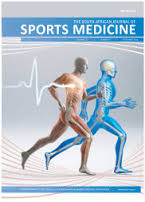Blood flow restriction training in South Africa – a panel discussion
DOI:
https://doi.org/10.17159/2078-516X/2022/v34i1a14796Abstract
Background: Blood flow restriction (BFR) training uses a cuff to partially occlude venous blood flow and improve musculoskeletal training outcomes. Over the past 25 years, numerous studies have demonstrated its relative safety and efficacy.
Objectives: Blood flow restriction training is under review by the Health Professions Council of South Africa due to safety and ethical concerns. The objective of this roundtable discussion is to gain better insight into the current use and perception of blood flow restriction training in South Africa.
Formation of panel: The expert panel had experience with the use of BFR training and included one representative from each of the following professions, namely, sports medicine, physiotherapy and biokinetics.
Discussion: The panellists provided their unique perspectives on BFR training, whilst reaching a relative consensus on its safety, screening, efficacy, and appropriate use. Agreement on appropriate loading and occlusion pressure protocols during different phases of rehabilitation was less clear.
Conclusion: Although BFR is a safe and effective modality, the development of evidence-based protocols among different health professionals in South Africa is required to ensure good clinical practice.
Downloads
Downloads
Published
Issue
Section
License
Copyright (c) 2022 South African Journal of Sports Medicine

This work is licensed under a Creative Commons Attribution 4.0 International License.
The South African Journal of Sports Medicine reserves copyright of the material published. The work is licensed under a Creative Commons Attribution 4.0 (CC BY 4.0) International License. Material submitted for publication in the South African Journal of Sports Medicine is accepted provided it has not been published elsewhere. The South African Journal of Sports Medicine does not hold itself responsible for statements made by the authors.
How to Cite
- Abstract 658
- PDF 534






.png)